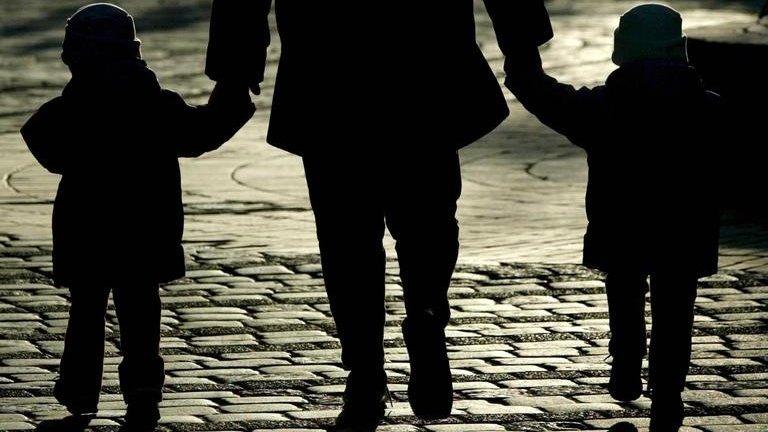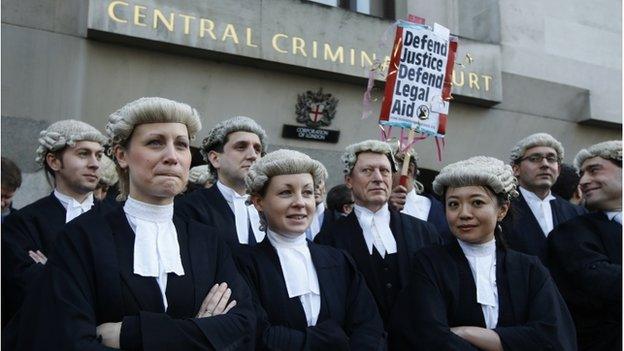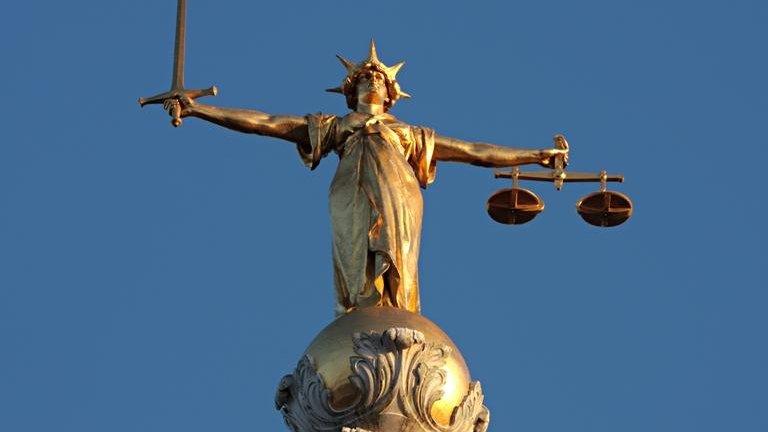Legal aid cuts 'not thought through early enough'
- Published

The government did not "think through" its legal aid cuts early enough and "does not know" whether people in need of aid are getting it, a report says.
The National Audit Office said £300m a year would eventually be saved but other impacts of changes were unknown.
It also said the number of family court cases about child contact where neither parent had a lawyer rose by 89% in 2013/14 in England and Wales.
The government said cuts were essential and it was not an "easy process".
Since April 2013, a range of civil cases - including most family, debt, housing, employment and social welfare cases - have not qualified for legal aid.
Of family court cases starting in 2013/14 involving contact with children, there were 17,268 in which neither party had a lawyer - up from 9,158 in 2012/13.
Overall, there were 79,747 family court cases where neither party was represented - up 30% from the previous year.
'Wider costs'
The NAO said the government was "on track to meet its main objective of significantly reducing in a short timeframe spending on civil legal aid", with estimated savings of £300m a year "in the long term".
But it said it was "less clear" whether it had met other objectives of reducing "unnecessary litigation" and targeting legal aid at those who need it most.
It said the Ministry of Justice "did not think through early enough" the full impact of its changes and "does not know whether people who are eligible for legal aid are able to get it".

Analysis
by Clive Coleman, BBC legal affairs correspondent
The government wanted to cut the annual legal aid budget of £2.1 billion by £350 million and is well on its way to achieving that.
Some will consider that a good deal for the taxpayer - as the additional cost of the reforms is a modest £3.4 million a year. But the real cost is a sharp rise in those with little choice but to represent themselves.
That is especially acute in family cases involving divorce and couples trying to sort out living arrangements for their children.
At a traumatic time for families, the lack of independent legal advice and representation can aggravate an already heated situation.
The government hoped mediation - less expensive and less confrontational than court - would be a panacea in many cases.
So it is especially worrying that there has been a dramatic fall in the number of couples choosing to take that step.

The NAO report also noted a 38% fall in the number of mediation cases starting in 2013-14 compared with 2012-13 - a fall of 5,177 cases - despite the government saying legal aid cuts would "divert" people from courts to mediators.
It estimated that people appearing in court unrepresented would cost the taxpayer an extra £3.4 million a year for reasons including the fact they "tend to lack the knowledge and skills required to conduct their case efficiently".
"There may also be costs to the wider public sector if people whose problems could have been resolved by legal aid-funded advice suffer adverse consequences to their health and wellbeing as a result of no longer having access to legal aid," the report added.
'Reckless assault'
Margaret Hodge MP, chair of the Public Accounts Committee, said the increased number of child cases where both parents were unrepresented was "concerning".
"The ministry is out of touch with reality and has shown no understanding of the wider cost of its reforms," she said.
Labour's shadow justice secretary Sadiq Khan said the government had "completely failed on legal aid".
"This damning report by the NAO completely exposes David Cameron's reckless assault on access to justice for what it really is: bad value for money and leaving hundreds of thousands without proper legal advice," he said.
But an MoJ spokesman said the legal aid system previously cost £2bn a year and the government had "no choice but to find significant savings" at a time of financial crisis.
"This was never going to be an easy process, but we have made the necessary reductions whilst ensuring legal aid remains available where people most need legal help," he said.
Family courts, external handle a range of cases including divorce, adoption and parental disputes over children.
- Published13 October 2014

- Published2 September 2014

- Published16 July 2014

- Published7 March 2014

- Published1 April 2013
